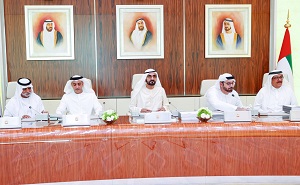Media Center
UAE Cabinet approves Strategy for Advanced Skills National Programme
The UAE Cabinet, chaired by His Highness Sheikh Mohammed bin Rashid Al Maktoum, Vice President, Prime Minister and Ruler of Dubai, approved the Strategy for the Advanced Skills National Programme.
The Cabinet meeting was attended by H.H. Lt. General Sheikh Saif bin Zayed Al Nahyan, Deputy Prime Minister and Minister of the Interior.
The Strategy for the Advanced Skills National Programme includes strategic objectives to position the UAE as a world leader in the field of advanced skilled development.
It represents a comprehensive system that employs future skills in vital areas in the UAE. His Highness Sheikh Mohammed bin Rashid Al Maktoum, said that the UAE is making education a top priority and making it sustainable, diverse and adaptable to the requirements of future development plans.
"We want Emiratis to be prepared for the changes around us and equipped with advanced skills that maintain UAE’s competitive edge," His Highness added.
The Strategy for the Advanced Skills National Programme reflects the proactive and agile government vision for the future and aims to achieve community happiness and adopt best practices.
The programme's strategy is based on five key themes and a number of initiatives aimed at employing advanced skills in vital areas such as education, economy and the quality of life.
The first element of strategy includes the definition of advanced skills, identified through the study of international systems and models of advanced skills required in UAE’s government and job market, in collaboration with over 70 different entities and companies representing 13 sectors locally and globally. 12 different skills have been identified for the UAE in four main categories: basic skills, competencies, personal traits, and specialised skills.
The second element includes advanced skills measurement tools, which will be done through a number of partnerships with international organisations, research institutions and academia to develop skills measurement mechanisms.
The third element aims to identify the target groups. The national program aspires to reach a number of target groups: students at various academic and academic levels, new graduates and employees in the public and private sectors.
The fourth element includes policies and programs, to ensure the participation of stakeholders, and build strong partnerships with the private sector, as well as develop the content of educational and training programs.
The fifth element is to inspire the community by raising awareness of the importance of advanced skills and providing opportunities for all groups to acquire advanced skills and lead their own development through continuous learning.
The UAE Cabinet also adopted the formation of the Advanced Skills Council to oversee relevant policies, programs and initiatives.
The Council includes representatives from the Ministry of Economy, Ministry of Education, Ministry of Human Resources and Emiratization, The Federal Authority for Government Human Resources, the Federal Youth Authority, Advanced Sciences portfolio, Artificial Intelligence portfolio, the Abu Dhabi Department of Education and Knowledge, and Knowledge and Human Development Authority.
In a different topic, the Cabinet also discussed the general framework for the "Security and Agility of Vital Entities", with the aim of unifying national efforts in the area of infrastructure security and agility.
The plan also aims to develop contingency plans and to ensure the continuity of services in all circumstances as part of a comprehensive risk management plan.
The Cabinet also adopted a Federal Law Decree amending certain provisions of the Federal Law on Personal Status, in the context of supporting family stability and cohesion.
In the governmental and regulatory affairs, the Cabinet adopted the formation of the Higher Committee for the Services of People of Determination in the UAE, with the aim of providing all needed support and empowerment.
The committee is responsible for assessing and studying the current situation and the challenges faced by People of Determination in all field including educational, rehabilitation, health, social and employment aspects.
The committee will also propose relevant policies and follow up on the implementation of programs and initiatives for People of Determination.
The Cabinet also reviewed the recommendations of the Federal National Council on the subject of "The policy of the Ministry of Health and Community Protection", as well as the adoption of the unified final account of the Federation for the fiscal year 2018.


